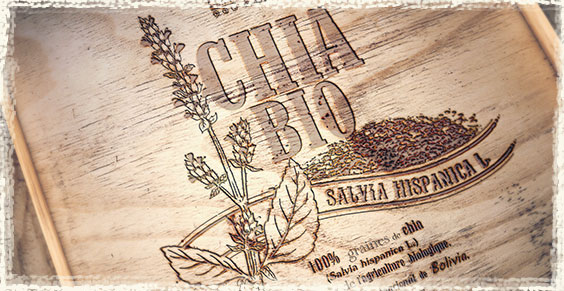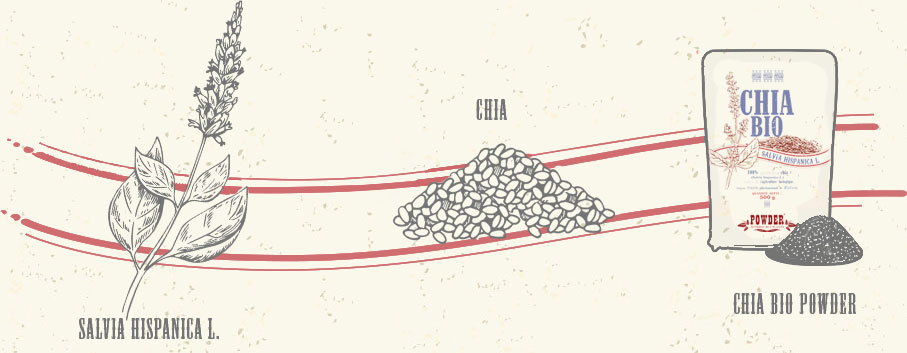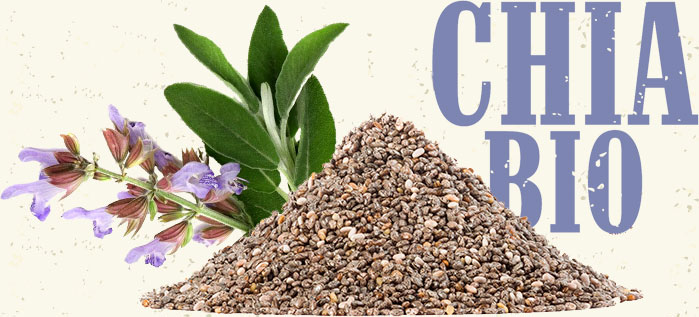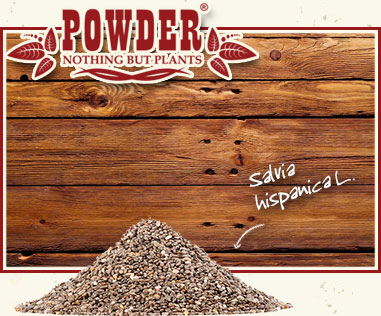Buy Organic chia seeds
11,40 € (11,40 €)
Quantity
Description: Organic chia seeds

Discover the exceptional properties of SUPERFOODS with the new powder range from our new brand POWDER Nothing But Plants® range!
This product range offers an innovative concept: an alternative way of consuming dietary supplements and healthier foods – in milkshakes, salads or mixed with your favourite foods.

DESCRIPTION
Chia (Salvia hispanica L.) is a plant native to southern Mexico and northern Guatemala that was used in ancient times because of its exceptional nutritional properties.

Chia seeds are rich in essential fatty acids, primarily linolenic acid (omega 3), proteins and fibres. They also contain antioxidant compounds that add to the beneficial properties of these seeds.
Considered a superfood, chia seeds not only have high nutritional value, but also anti-diabetic, antioxidant, anti-inflammatory and lipid-lowering properties. Thanks to their fibre content they also offer digestive and satiating properties.
Our chia seeds (Salvia hispanica L.) are a natural source of vegetable omega-3, minerals and fibre. Include this superfood in your daily diet!
ORIGIN
Chia (Salvia hispanica L.) belongs to the Lamiaceae family (of which mint and thyme are also members) and is native to southern Mexico and northern Guatemala (1). It is an annual herbaceous plant that can grow to one metre tall, its leaves are wide and their flowers can be purple, blue or white.
Chia seeds are oval, dark grey with small black lines and are approximately 2 mm long and 1 mm wide (2).

HISTORY
The word "chia" is a word from the Nahuatl language that refers to several botanical species of different genuses, including the Salvia genus. Chia was, during pre-Columbian times, a very important plant, and its seeds, oil and flour were highly valued due to their food, artistic and religious uses (3). It was also one of the main crops grown in Central America at that time, only surpassed in importance by maize and bean cultivation. Of great value to the Mayan and Aztec civilisations (1), when the Spanish arrived, consumption declined dramatically (4). Currently, cultivation of Salvia hispanica has spread to South America, mainly for its oilseeds (1).
COMPOSITION
Lipids make up 25-40% of the composition of chia seeds, of which 60% is alpha-linolenic acid (omega 3) and 20% linoleic acid (omega 6). They also contain proteins (15-25%), carbohydrates, fibre, minerals (calcium, phosphorus, magnesium, potassium, iron, zinc and copper) and vitamins (1, 5). Chia seeds are also a powerful source of antioxidant molecules such as polyphenols, myricetin, quercetin, kaempferol, caffeic and chlorogenic acids (1).
- OUR PRODUCT
- Product Name: Chia from organic farming
- Scientific name: Salvia hispanica L.
- Part used: Seeds
BENEFITS
Chia seeds have anti-diabetic, antioxidant, anti-inflammatory, digestive and lipid-lowering properties (help to lower blood lipids and improve lipid profile) (1, 5).
USAGE, DOSAGE
Chia seeds are an excellent alternative for gluten-free recipes: they can be used as a gelling agent and for making pastries. The quantity of wheat-based flour is replaced by a mixture of 50% ground chia seeds and brown rice flour (6). They can also be eaten raw with yoghurt, soft cheese or in smoothies.
We recommend grinding the seeds before eating them to maximise their nutrients or, if it is the mucilage (soluble fibre) that you want to consume, we recommend leaving them to soak for 30 minutes.
Daily intake of chia seeds should not exceed 15 g.
STUDIES
Chia seeds (Salvia hispanica L.) have numerous benefits, mainly related to their fibre and omega-3 fatty acids (alpha-linolenic acid) content. The presence of this essential fatty acid has been linked to a decrease in inflammatory response (7) and of visceral fat, which helps to protect the liver and heart (8). An improvement in dyslipidemia (abnormal lipid levels) has also been observed, together with insulin resistance and a decrease in systolic blood pressure due to consumption of chia seeds (9-10).
Finally, chia seeds have digestive and satiating properties. Mucilages are soluble fibres that, when ingested together with liquids, form a viscous gel in the digestive system that slows down the absorption of nutrients and delays gastric emptying, creating a feeling of fullness (11).

BIBLIOGRAPHY
- Pharmacological properties of Salvia hispanica (chia) seeds: a review. Gazem et al. J Crit Rev. 2016. 3(3): 63-67.
- The promising future of chia, Salvia hispanica L. Ali et al. J Biomed Biotechnol 2012: 171956.
- Caracterización morfológica de chía (Salvia hispanica) (Caractérisation morphologique du chia). Hernández and Colín Rev Fitotec Mex. 2008. 31(2): 105-113.
- Evaluation of whole chia (Salvia hispanica L.) flour and hydrogenated vegetable fat in pound cake. Pizarro et al. LWT Food Sci Technol.2013. 54(1): 73-79.
- Caracterización de la semilla del chan (Salvia hispanica L.) y diseño de un producto funcional que la contiene como ingrediente (Caractérisation de la graine du chia et conception d'un produit fonctionnel dont elle est un ingrédient). Ixmucané Revista de la Universidad del Valle de Guatemala 23 (Revue de l'Université Valle de Guatemala). 2011. 43-49.
- http://www.consum.es
- A dietary pattern including nopal, chia seed, soy protein, and oat reduces serum triglycerides and glucose intolerance in patients with metabolic syndrome. Guevara-Cruz et al. J Nutr. 2011. 142(1): 64-69.
- Lipid redistribution by α-linolenic acid-rich chia seed inhibits stearoyl-CoA desaturase-1 and induces cardiac and hepatic protection in diet-induced obese rats. Podyal et al. J Nutr Biochem.2012. 23(2): 153-162.
- Dietary chia seed (Salvia hispanica L.) rich in alpha-linolenic acid improves adiposity and normalises hypertriacylglycerolaemia and insulin resistance in dyslipaemic rats. Chicco et al. Br J Nutr. 2009. 101(1): 41-50.
- Mechanisms involved in the improvement of lipotoxicity and impaired lipid metabolism by dietary -linolenic acid rich Salvia hispanica L (Salba) seed in the heart of dyslipemic insulin-resistant rats. Creus et al. J Clin Med. 2016. 5. 18.
- Manual de Fitoterapia (Manuel de Phytothérapie). Castillo-García E, Martínez-Solís I.1ère Édition révisée. Espagne : Elsevier Masson, 2011.
Ingredients: Organic chia seeds
†N/A: Not applicable
Food allergens:
This product does not contain allergens (in accordance with Regulation (EU) No 1169/2011) nor genetically modified organisms.
ORGANIC CHIA SEEDS: NUTRITIONAL INFORMATION
Use: Organic chia seeds
DIRECTIONS:
The daily intake is no more than 15 g.
STORAGE INSTRUCTIONS:
Store in a cool dry place away from sunlight.
Quality: Organic chia seeds
PRODUCT NAME
Organic chia seedsBOTANICAL NAME
Salvia hispanica L.REFERENCE
KC30QUANTITY
500 gBATCH NUMBER
D16531EXPIRATION DATE
2025/04MADE
In FranceFABRICATION AND GUARANTEE:
This food is manufactured following GMP standards. GMPs are the good manufacturing practice guidelines for the European food industry.
Organic products at Anastore are produced in accordance with Council Regulation (EU) No 2018/848 of 30 May 2018 and its subsequent amendments on organic production and the labelling of organic products, with the aim of ensuring consumer confidence and protecting consumer interests.
Certificate issue date:
Questions: Organic chia seeds
Would you like more information about our product?
Ask your question here and our team of experts will answer you as soon as possible.













































